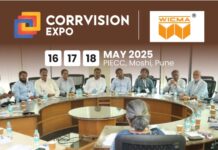
The aim of the summit is to provide a positive context in which leaders from Government, educational institutions and corporate organisations such as Principal Secretaries, Vice Chancellors, business leaders, and other policy makers can share expertise and ideas and create new partnerships It is only by collaboration and integration that we can ensure students leave higher education with the English language and personal skills needed for the region’s dynamic economy. Although the challenge is significant, by harnessing both the transformational power of digital learning, and the growing willingness for private and public sector collaboration, we can find innovative solutions to complex problems, and define practical reforms with real purpose and power.
Ms Shobha Mishra Ghosh, Sr Director, FICCI said, “Employability is a far bigger challenge than unemployment. Language and communication skills are some of the major skill gaps found in our youth. To bridge this gap, FICCI has been persistently working with all stakeholders towards creating an ecosystem to enhance employability of graduates. FICCI is happy to partner in this Summit which is a step in this direction.”
Saul Nassé, Chief Executive, Cambridge English Language Assessment said, “South Asia is fast becoming a global economic powerhouse, but progress will be limited if employees do not possess the necessary English and soft skills – and these can only be developed by partnership and collaboration among leaders in Government, education and business. The Summit is a real opportunity for these leaders to come together, share perspectives and start to build the partnerships essential for change.”
Ratnesh Kumar Jha, Manging Director Cambridge University Press South Asia said, “The world is witnessing a shift of balance towards South Asia with India at the forefront of global corporate engagement. Today, India is the preferred knowledge economy with a vast pool of young professionals. To train and provide a skilled workforce to the world, the onus now is on the Government and Education Institutions. This summit aims at bringing together Government officials, Vice Chancellors of Universities, academia, educationalists and representatives of the corporate world to facilitate skill development and to deliberate and reflect on the challenges and their solutions. I am hopeful that this collaboration will have a snowballing effect on skill development in India.”
The summit will comprise plenary presentations, to frame the debate, followed by break-away sessions, hosted by panels of experts, to explore and discuss four key themes: language skills for employment – a focus on teaching; digital learning technologies; employment; and research and innovation.
Language skills for employment – a focus on teaching
English is now the lingua franca of international business, and increasingly the medium of instruction in education, bringing sharply into focus the language teaching strategies of the South Asia region, and the skills and abilities of English language teachers. The teacher’s own language therefore becomes the model which learners follow. This raises a number of questions which the session will explore.
Digital learning technologies
This session will consider how best to evaluate digital learning tools as effective learning instruments, and how to integrate digital learning into both the classroom and new learning environments.
Employment
This session aims to examine and prioritise soft skills in the work place and determine the best way to develop and nurture these abilities in order to create fully rounded employees.
Research and Innovation
This session will look at the strides made in research in the field of English language education around the world and how it relates to South Asia, and identify key areas for improvement.
Delegates interested in attending the summit can request an invitation at:
http://events.cambridgeenglish.org/south-asia-summit/
Key Speakers
Saul Nassé – CEO, Cambridge English
Dr Ted Briscoe – Professor of Computational Linguistics, specialising in Human Language Technologies, Cambridge University
Dr Nick Saville – Director of Thought Leadership, Cambridge English
Dr Hanan Khalifa – Head of Research and International Development, Cambridge English
Dr A Didar Singh, Secretary General, FICCI
Mr Mohandas Pai, Chair-FICCI HE Committee & Chairman-Manipal Global Education
Dr Rajan Saxena, Co-Chair-FICCI HE Committee & Vice Chancellor, NMIMS University
Dr Indira Parikh, Co-Chair FICCI HE Committee & Founder President, FLAME
Mr Anand Sudarshan, Director, Sylvant Advisors
Corporate Comm India(CCI Newswire)


























